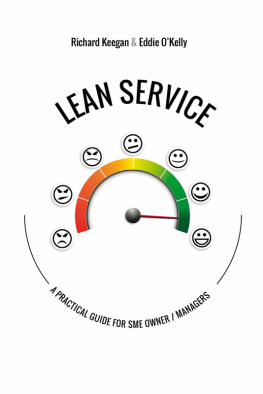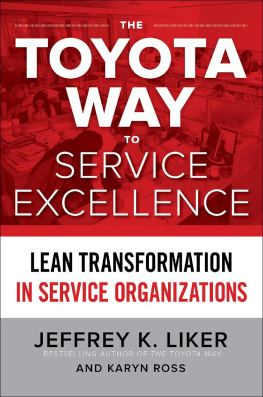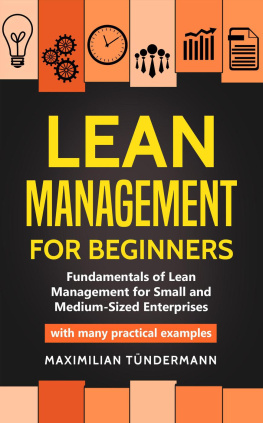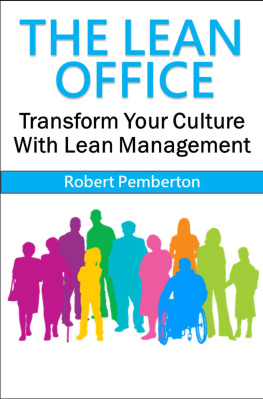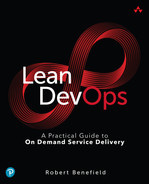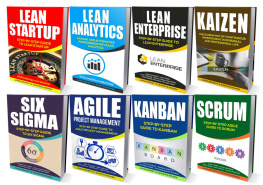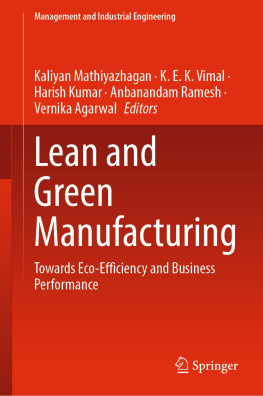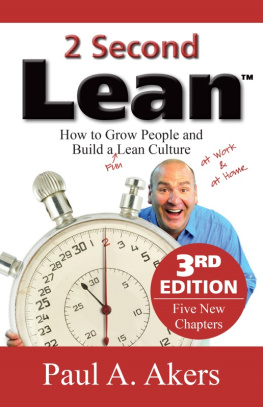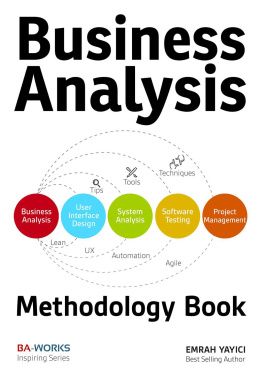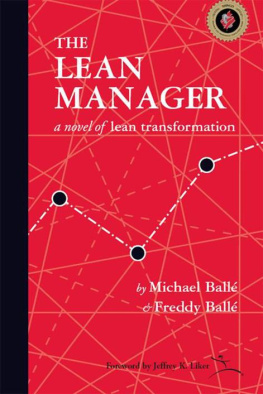About the Authors
Richard Keegan is the manager of the Competitiveness Department at Enterprise Ireland, where he and his team are responsible for the Lean Business Offer, the Benchmarking Service, Environmental Assessments and the Green Start and Plus Programmes, as well as for the Envirocentre.ie and assisting companies to access European support for environmentally-based improvement products. He has written extensively on the area of Lean/Best Practice/World Class Business. He was awarded a doctorate for his research into applying Lean/World Class ideas with Irish companies. He is Adjunct Assistant Professor in the Business School at University of Dublin, Trinity College, teaching Operations Strategy at MBA level and Operations Management at undergraduate level, a visiting Associate Professor at University of Northern Iowa and a Fellow of Engineers Ireland. His approach of combining benchmarking and Lean tools and techniques has been adopted by UNIDO to help companies in the developing world to achieve competitiveness.
MEJ (Eddie) OKelly is Emeritus Professor of Industrial Engineering at National University of Ireland, Galway. A holder of three masters degrees in Engineering and a PhD in Applied Mechanics, Electrical Engineering and Economics, he worked as a professional engineer in Paris and Strasbourg before setting up a subsidiary of Ulmic s.a. in Cork. Following a period as a management consultant, he was appointed to the Chair and Head of the Department of Industrial Engineering at University College, Galway (now NUIG), where his main research interests were production system analysis and manpower analysis. A chartered engineer, he was elected to fellowships of the Institution of Engineers of Ireland, of the Institution of Production Engineers, of the Institution of Electrical Engineers, and of the Institute of Management. He served as Deputy Chairman of Electricity Supply Board, the integrated electricity company in Ireland, and was the founding Chairperson of EirGrid Plc, the independent electricity transmission system operator in Ireland.
LEAN SERVICE
A Practical Guide for SME Owner / Managers
Richard Keegan & Eddie OKelly
Published by OAK TREE PRESS
www.oaktreepress.com / www.SuccessStore.com
2015 Richard Keegan and Eddie OKelly
A catalogue record of this book is available from the British Library.
ISBN 978-1-78119-177-4 (Paperback)
ISBN 978-1-78119-178-1 (ePub)
ISBN 978-1-78119-179-8 (Kindle)
ISBN 978-1-78119-207-8 (PDF)
Cover image: Felix Pergande / 123rf.com
Cover design: Kieran OConnor Design
All rights reserved.
No part of this publication may be reproduced or transmitted in any form or by any means, including photocopying and recording, without written permission of the publisher. Such written permission must also be obtained before any part of this publication is stored in a retrieval system of any nature. Requests for permission should be directed to Oak Tree Press ().
Figures
Case Studies
1 Applying Lean Principles in Openet
Shane OFlynn, Openet
2 Control Rooms at Irish Rail
Peter Smyth, Chief Mechanical Engineer, Irish Rail
3 First Steps in Continuous Improvement
Ellen Brian, Director Lean Program Europe, Deutsche Post DHL
4 Parker Advertising
Kingsley Dempsey, Parker Advertising
Anthony Collins, Directski.com
6 Thornton & Partners
Marc Sweeney, Director, Thornton & Partners
7 Lean in Professional Service Firms
Patrick Burke, Partner, Grant Thornton
8 Lean in Service
Michael Twohig, Head of Continuous Improvement, Musgrave Group
Dedications
To Geraldine, Aoife and Maeve, you are my life.
Richard
In grateful appreciation to Jane + 6 for sharpening my understanding of Best in Class.
EOK
Thanks
With special thanks to all the companies and colleagues who have helped to make this book a reality.
Thanks to Enterprise Ireland for supporting this work.
In a corner of North Wales, in Deeside, Toyota built an engine manufacturing plant in 1991. In this plant, there is a group of enthusiasts, led by Kevin Robinson, deputy managing director, collectively known as the Toyota Lean Management Centre, who have shared their understanding of best practice, how to look at processes and how to build the sustainable capacity of people, processes and business. At this point, Richard has visited the plant 49 times, with over 1,200 Irish managers. The Management Centres support has been very helpful to Richard personally and to the managers in developing an understanding of what is possible.
Foreword
The global services industry is undergoing dynamic change driven by the development and rapid adoption of new technologies, including cloud computing, mobile communications, data analytics (based on big data) and social technologies.
Irish companies in the internationally traded service sector are participating fully in the opportunities that exist within the global marketplace. Exports by Irish companies assisted by Enterprise Ireland were in excess of 1.7bn in 2014.
The internationally traded services sector is a significant employer in Ireland, accounting for almost 17,000 jobs and so the sector is a key priority for Enterprise Ireland. A significant proportion of these jobs exist outside of Dublin, particularly in the BPO sector where clusters of excellence exist in Waterford, Cork, Limerick and Donegal.
Many Irish service companies have achieved international success with the support of Enterprise Ireland. We have worked with these companies to help them develop capability of their people and processes at home, to approach international markets with confidence. Our teams in international markets have opened doors of opportunities for Irish companies, introducing them to global decision-makers in markets of greatest potential.
Key to success in a global marketplace is the development of Lean principles and practices within processes and service delivery. This book provides material and examples to support the adoption of Lean to develop competitiveness in competing in the global service industry. I hope you find it useful.
Julie Sinnamon
Chief Executive, Enterprise Ireland
1: Introduction
It is clear that service businesses are very important to our modern economies and so it is increasingly important that our service businesses are efficient and effective, too.
Service businesses can be local or global in their nature. A barbers shop or hairdressing salon is obviously a local service, while many software businesses operate at the international, if not global, level. Some local services, such as medicine or dentistry, are now evolving into international service businesses with the advent of cheap air transport and, at the extreme level, the use of long-distance robotic surgery systems, where a patient can be located many thousands miles away from the surgeon. Remote diagnostic services or analysis of scans is now regarded as commonplace in medical circles.
This internationalisation of services can be helpful or challenging to a service business. It can be helpful if you can locate partners overseas where work can be continued over your night, allowing your service to be progressed and delivered at maximum speed. It can be challenging if an overseas service provider can access your market, at better rates.
The challenge for service companies is to understand their value proposition, their processes and their customers needs and wants. As our societies continue to develop and to want / need more services, it is essential that our service companies take on the challenge to develop their effectiveness and efficiency while, at the same time, developing more and better value creation and retention opportunities.
Next page
